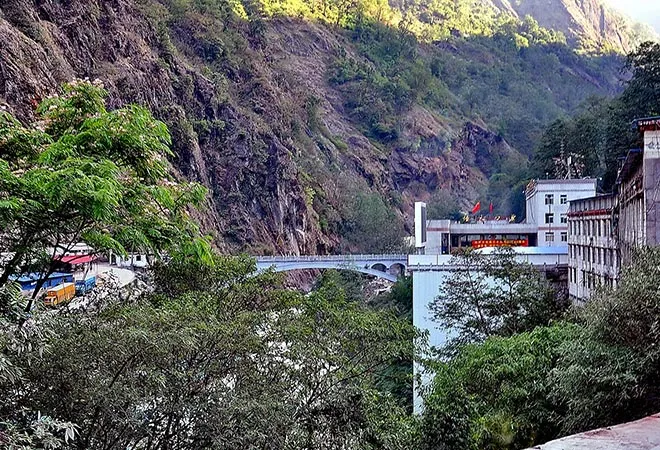
Two days before the two-day Summit began in Beijing on May 14 on the Belt and Road Forum, the Nepal Government signed the Memorandum of Understanding on the framework agreement with China. The agreement was signed in Kathmandu by Nepal’s Foreign Secretary Shankar Das Bairagi and Chinese Ambassador Yu Hong. Also present were Deputy Prime Minister and Finance Minister Krishna Bahadur Mahara and Foreign Minister Prakash Sharan Mahat. Mahara also led the country’s delegation to the Summit, with two more ministers -- Physical Infrastructure Minister Ramesh Lekhak and Communications Minister Surendra Karki. Twenty-eight heads of state and over 150 countries participated in the Summit.
Initially, the Chinese government had invited Prime Minister Pushp Kamal Dahal to attend the OBOR conference. But he is unable to attend the conference because on the same day, on May 14, he will be busy in holding local elections in the country.
It was for a long time that Nepal avoided Beijing’s pressure to join OBOR initiative. Possibly, the country was hesitant to do so realising some of its negative implications on the economy. However, the sudden decision on the part of Nepal government to participate in OBOR conference immediately after the 10-day military training exercise with China surprised even the political pundits in Nepal.
As it is well known, US $ 1 trillion-OBOR happens to be the pet initiative of Chinese President Xi Jinping that he evolved in 2013. As per the plan, OBOR intends to build on ancient Silk Road and link as many as 65 countries, constituting nearly 4.4 billion people in Asia, East Africa, the Middle East and Europe. The controversial China Pakistan Economic Corridor (CPEC), an ambitious $ 54 billion project under OBOR, joins Kashgar of western China with Gwadar port of Pakistan on the Arabian sea closer to Iran’s border is part of this initiative. This project passes through Pakistan’s disputed northern region that India claims to be part of its Jammu and Kashmir province.
While the Nepalese government signed the OBOR initiative, no attempt has yet been made from any quarter in the country to invite broader debate on its pros and cons. The common people in Nepal have been put in the dark as they know very little about its consequences. Nevertheless, certain lobby in Nepal has started creating an impression that the OBOR initiative would help develop infrastructural facilities like the roadways and railways, which will contribute in the long-term growth of the country.
However, experience shows that most of the countries that have joined the OBOR club are yet to benefit from it. If at all this initiative has served the geostrategic interest of any country, it is China.
Studies carried out on OBOR reveal that the grant element in OBOR is minimal. In CPEC, for example, the grant element is only four per cent as the rest of the amount is given to Pakistan at quite higher interest rate through the commercial banks of China.
The OBOR initiative provides China clue to exploit natural resources of the countries that join this club. It also provides market for the Chinese goods which often is of inferior quality. The local industries find it increasingly difficult to compete with such goods because of the price factor. As such, the unemployment rate in those countries is rising.
There is least of use of local manpower in the OBOR projects. Often, China becomes aggressive in controlling the management of mega projects that it supports, which is quite evident in the case of the Hambantota port of Sri Lanka and the Gwadar port of Pakistan.
Significantly, China has its own compulsion to promote the OBOR initiative in view of the overproduction of steel, cement and other construction materials in the country. Such materials have to be dumped somewhere to keep the Chinese factories running and also to maintain employment at home.
The OBOR initiative is also a tool to enhance Chinese influence in its neighbourhood in particular and other countries in general. Those countries that receive loans under this initiative are often coerced to work in Chinese interest. Countries like Laos, Cambodia, Myanmar and Thailand had to give up their common stand on the territorial claims by China in the South China Sea under the Chinese pressure. China could have blocked the loan for the OBOR-related projects to those countries had they not toed in China’s line.
Conditions attached to loans under OBOR initiative are so hard that several countries find it increasingly difficult to get out of the debt trap. In certain quarters, there is a feeling that this is a step towards colonisation. Therefore, in such a short of time of two to three years, discontentment against the OBOR initiative has started growing. In several countries, including in Sri Lanka and Nigeria, enquiry has begun against certain Chinese companies that influenced regimes through illegal means.
Now coming to Nepal’s case again, there are high chances that the country would badly fail to deal with China in the matter of strings to be attached to the OBOR initiative. And the country could fall in China’s debt trap, though the infrastructure projects to be launched under this initiative would not benefit the economy. Room for Nepal to benefit from the OBOR projects is quite bleak.
Being well aware of the implications of the OBOR, India has desisted from supporting this Chinese initiative. Even in the Summit at Beijing, there were no Indian government participation, though some of the business persons might join it in their individual capacity.
India in its backyard might somewhat lose its influence in Nepal because of the strategic leverage that China could get through the OBOR agreement with Nepal. But more than that, Nepal itself will lose more as somewhere it would have to compromise with its sovereignty. The Prachanda government or so to say any other government in Nepal would find itself helpless to control elements that could be involved in future OBOR projects in the country. Such has been the experience of Sri Lanka, Pakistan and many other countries. There is no reason why this will not happen in Nepal. But it will perhaps be too late for Nepal by the time it could realise its mistake.
The views expressed above belong to the author(s). ORF research and analyses now available on Telegram! Click here to access our curated content — blogs, longforms and interviews.




 PREV
PREV


